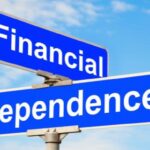Financial independence is the ability to support your lifestyle without relying on active work or external assistance. It represents freedom from financial stress, enabling individuals to pursue their passions, spend quality time with loved ones, and live life on their terms. It’s not just about accumulating wealth—it’s about managing resources wisely and making informed decisions to sustain a desired quality of life.
In this article, we’ll explore the journey to financial independence, actionable strategies to achieve it, and the role of financial empowerment in maintaining long-term stability.
Why is Financial Independence Important?
Financial independence is about more than just money; it’s about freedom and security. Here are some key reasons why it matters:
- Freedom of Choice:
Financial independence allows you to make decisions based on personal values and goals rather than financial constraints. - Stress Reduction:
With sufficient savings and investments, financial stress diminishes, improving mental and emotional well-being. - Pursuing Passions:
You can dedicate time to hobbies, projects, or causes that align with your interests and values without worrying about income. - Retirement Preparedness:
Achieving financial independence ensures you have the resources needed to retire comfortably and enjoy later years.
Steps to Achieve Financial Independence
1. Set Clear Financial Goals
The first step toward financial independence is setting specific, measurable, and realistic goals. Determine what financial independence means to you—whether it’s retiring early, buying a home, or starting a business. Break these goals into short-term, medium-term, and long-term objectives.
2. Create a Budget and Stick to It
A well-structured budget is a cornerstone of financial independence. Track your income and expenses to understand your spending patterns. Allocate funds for necessities, savings, investments, and discretionary spending. Tools like budgeting apps can simplify this process.
3. Build an Emergency Fund
Unexpected expenses can derail your financial plans. Establish an emergency fund with three to six months’ worth of living expenses to ensure financial stability during unforeseen circumstances.
4. Reduce and Manage Debt
Debt is one of the biggest obstacles to financial independence. Focus on paying off high-interest debt first while maintaining minimum payments on other loans. Consider strategies like debt consolidation or the snowball method to accelerate repayment.
5. Invest Wisely
Investing is essential for growing wealth. Explore diverse investment options like stocks, bonds, mutual funds, or real estate. If you’re unfamiliar with investing, consider consulting a financial advisor to create a portfolio aligned with your goals and risk tolerance.
6. Diversify Income Streams
Relying solely on one source of income can be risky. Build multiple income streams, such as freelancing, passive income from investments, or a side business, to enhance financial security.
7. Prioritize Retirement Savings
Contribute regularly to retirement accounts like 401(k), RRSP, or IRAs. Take advantage of employer matching programs, where applicable, to maximize contributions. The earlier you start saving for retirement, the more you benefit from compound interest.
8. Continuously Educate Yourself
Stay informed about financial trends, investment strategies, and economic developments. Resources like financial blogs, books, and online courses can help you improve your financial literacy and make smarter decisions.
Overcoming Challenges on the Path to Financial Independence
Challenge 1: Impulse Spending
Combat impulse spending by differentiating between needs and wants. Implement a 24-hour rule for non-essential purchases and track your spending habits.
Challenge 2: Lack of Financial Knowledge
Many individuals struggle with financial independence due to limited knowledge. Take the initiative to educate yourself through workshops, webinars, or consulting professionals.
Challenge 3: Staying Disciplined
Maintaining financial discipline can be tough, especially when faced with societal pressures or unexpected events. Regularly review your goals and remind yourself of the long-term benefits of financial independence.
The Role of Financial Empowerment
Financial empowerment is a critical aspect of achieving and sustaining financial independence. It involves gaining control over your financial situation, understanding your resources, and making informed decisions that align with your goals. Here’s how financial empowerment supports your journey:
- Knowledge is Power:
Understanding financial concepts empowers you to make better decisions regarding investments, savings, and expenses. - Confidence in Decision-Making:
Financial empowerment helps eliminate fear and uncertainty, enabling you to make confident choices about your financial future. - Building Resilience:
With the right financial tools and strategies, you can navigate economic downturns or unexpected challenges more effectively. - Achieving Long-Term Goals:
Empowered individuals are more likely to stick to their financial plans, ensuring they achieve independence and security.
Incorporating Financial Empowerment into Daily Life
- Track Progress: Regularly monitor your financial goals and adjust your strategies as needed.
- Seek Support: Partner with mentors or financial advisors to guide you through complex decisions.
- Stay Motivated: Celebrate milestones, no matter how small, to maintain enthusiasm for your financial journey.
- Leverage Technology: Use financial apps to manage expenses, investments, and budgeting efficiently.
Conclusion
Achieving financial independence is a journey that requires discipline, planning, and a willingness to adapt. By following the strategies outlined above, you can gain control over your finances and build a life of freedom and security. Remember, financial empowerment is the key to sustaining your independence. Equip yourself with the knowledge, tools, and confidence needed to navigate your financial journey successfully.
Start today—empower yourself and take the first step toward a brighter, financially secure future.

